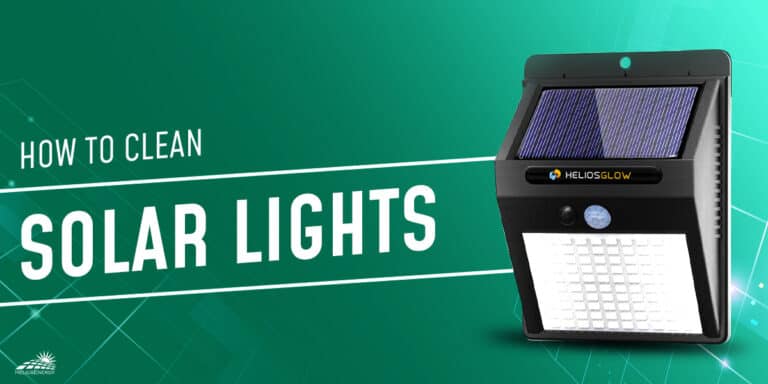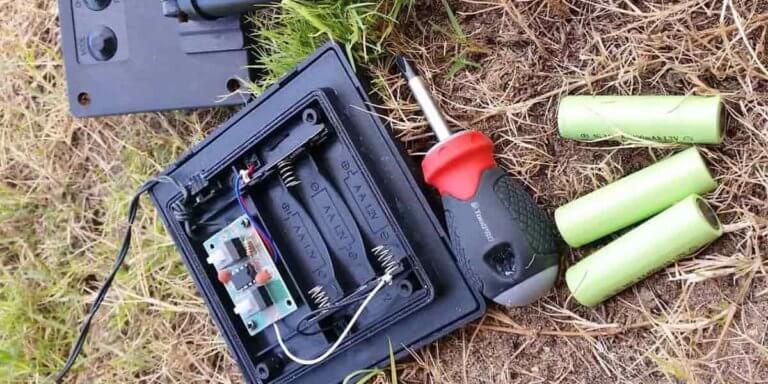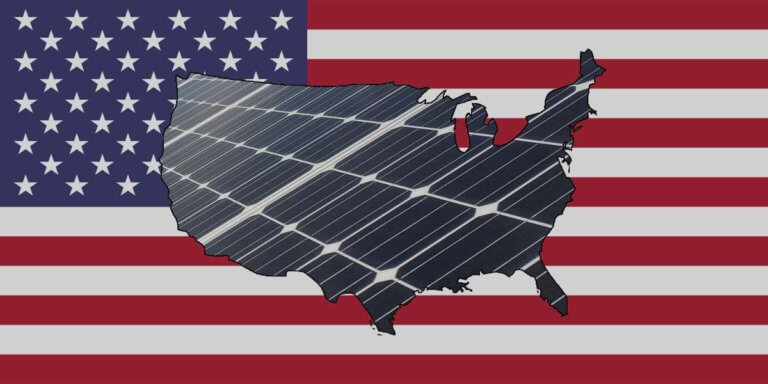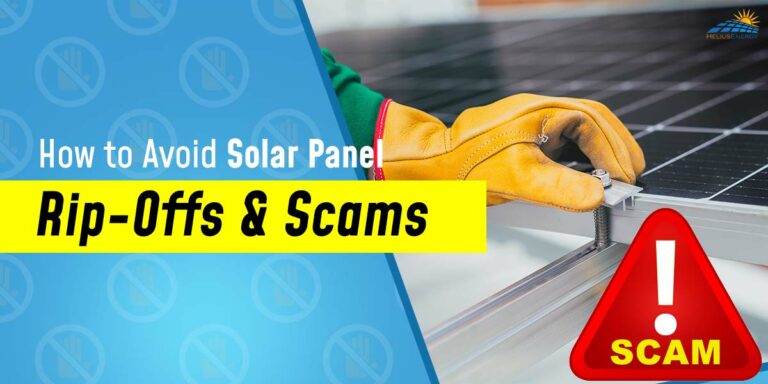Are Solar Panels Worth It In Florida? | Solar Question Answered
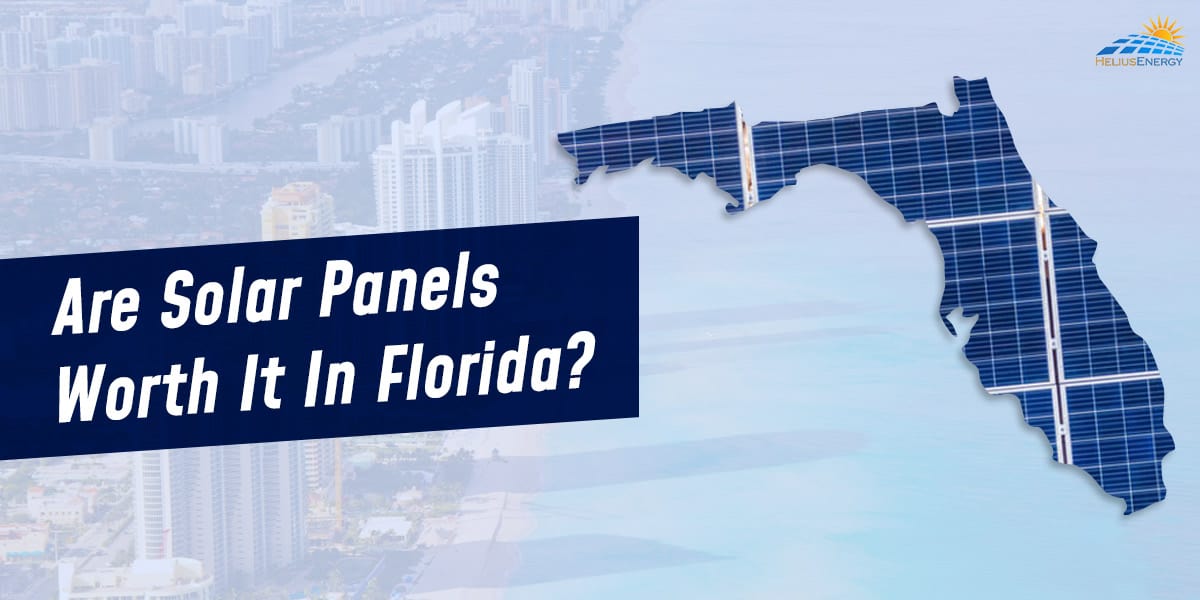
The number of home solar installations is rising, with Florida as one of the states leading the way. This trend is expected to last through 2022. Is it still worthwhile for the ordinary homeowner in Florida to install solar panels?
You can learn from the article whether investing in solar panels is worthwhile. You may decide for yourself whether it is profitable to install solar panels in your home after reading the comprehensive information that follows.
In Florida, solar is often a good investment. Generous electricity buy-back rates, the Florida state sales tax exemption, the property tax exemption, and the federal solar tax credit all work together to provide an appealing solar payback period of 11 years on average, making solar well worth the investment.
- 1. Are Solar Panels Worth It In Florida?
- 2. How Much Do Home Solar Panels Cost In Florida?
- 3. Solar Incentives Available In Florida
- 4. Benefits Of Solar Panels In Florida
- 5. How Long Do Solar Panels Last In Florida?
- 6. How Long Will A Solar Panel In Florida Take To Pay For Itself?
- 7. Factors To Look For When Consider Solar In Florida
- 8. Factors Affecting The Performance Of Solar Panels In Florida
- 9. Final Thoughts
Are Solar Panels Worth It In Florida?
If you think about solar panels, you must think of the sunshine. Florida is one of the states that receives ample sunlight for most of the year. It naturally makes sense to get solar energy in Florida.
But that alone is not enough to understand if solar panels are worth it in Florida. Let’s look at some facts and figures, shall we?
In fact, as reported by the National Solar Industries Association, Florida is in the fourth position for solar energy (NSIA).
Florida offers several enticing benefits for homeowners who install solar. This enables Florida homeowners to purchase and install new solar panels and be eligible for a 26% federal solar tax credit in 2021 and 2022.
Solar energy has a variety of special advantages, but one of the key factors in Florida’s popularity of these panels is the short- and long-term cost savings. Many homeowners experience a hundreds-dollar reduction in their utility bills after installing a system that is the right size.
How Much Do Home Solar Panels Cost In Florida?
As of the last quarter of 2022, the price per watt for solar panels in Florida is $2.58. A typical 6 kW solar system costs $15,660 before any incentives and $10,962 after the 30% solar tax credit.
Even though that’s a lot of money, if all incentives are taken into account, your final cost will be significantly lower.
Florida’s solar panel prices are less expensive than the $3.00 per watt national average for home solar energy systems.
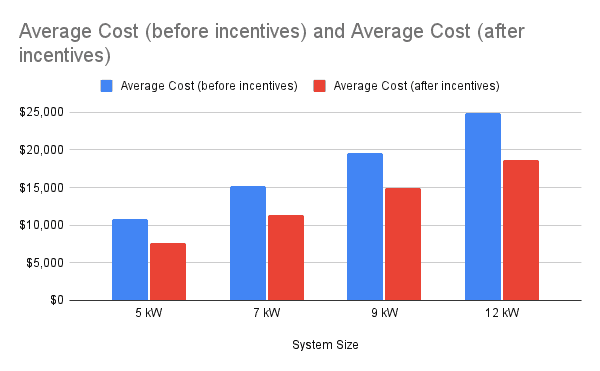
As you can see, the average cost of solar panels in Florida is lower than the national average. This is due to a number of factors, including the state’s high solar irradiance levels and the availability of solar incentives.
The federal solar tax credit (ITC) is a 30% credit that can be applied to the cost of installing solar panels. This credit is available for both homeowners and businesses.
Florida also offers a number of solar incentives, including:
- The Florida Solar Rebate Program, which offers a rebate of up to $2,000 for homeowners who install solar panels.
- The Florida Solar Renewable Energy Credits (SRECs) program, which allows homeowners to sell the solar energy they generate to utilities.
These incentives can significantly reduce the cost of solar panels in Florida. For example, a 5 kW solar system that would cost $10,880 before incentives could cost as little as $7,620 after incentives.
If you are considering installing solar panels in Florida, it is important to compare quotes from different solar installers. You should also factor in the cost of solar incentives when making your decision.
Solar Incentives Available In Florida
1. Solar Tax Credit
Florida doesn’t have a solar tax credit that is exclusive to that state. When individuals talk about the “Florida solar tax credit,” they most likely mean the 30% solar tax credit, officially known as the federal investment tax credit (ITC).
There are 50 states that are eligible for this government incentive. It enables homeowners who pay taxes to deduct 30% of the price of their solar system from their income taxes.
Put it another way, and the federal tax credit provides you with a 30% discount on your solar system. You can carry over the leftover debt for up to five years if your tax burden is less than 30% of the price of your solar system.
2. Net Metering
With the help of Florida’s net metering program, you can sell any excess solar energy you produce at full retail price to the state’s power system. For selling the electricity, it is essential for you to know to how to read net meters to properly understand how much electricity you have produced.
Due to the state’s abundant sunshine, your solar system will probably occasionally produce more electricity than you need for your home. This is why net metering is important in Florida.
Due to net metering, your utility must reimburse you at the rate you pay for electricity when this extra energy is exported to the grid. Solar energy pays for itself by reducing your electricity cost by 1 kWh for every kilowatt hour (kWh) that is sent to the grid.
3. Property Assessed Clean Energy (PACE program Florida)
Local governments in Florida are permitted to provide PACE financing for solar projects. PACE financing functions similarly to a loan but is repaid by increasing your local government’s property taxes.
PACE finances most energy efficiency improvements in addition to solar installations. If you decide to leave, the outstanding loan sum may be transferred to the new owner of the home.
PACE financing, however, does place a lien on your property and has the potential to have higher interest rates than other financing choices, such as a home equity line of credit.
It’s frequently advised to fund your solar project using a standard loan because consumer campaigners have also criticized PACE financing for taking advantage of people with poorer credit and incomes.
Benefits Of Solar Panels In Florida
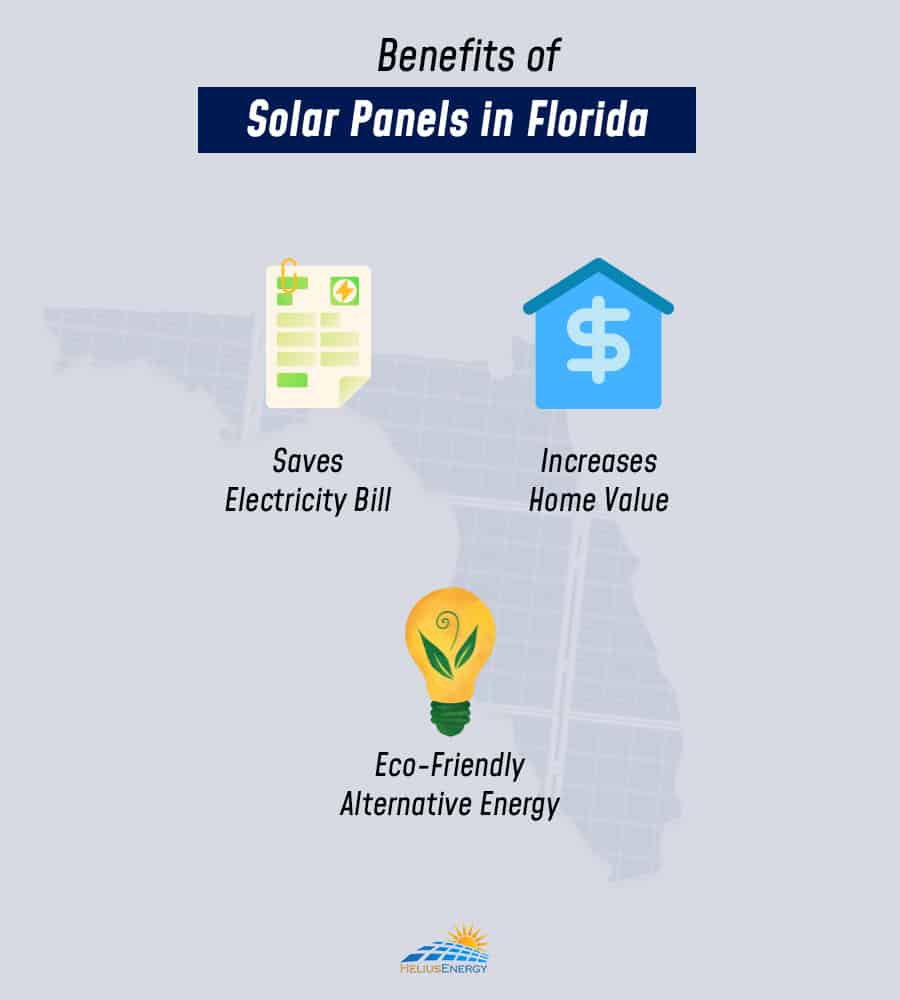
1. Saves Electricity Bill
No of the size of your installation, you may anticipate growing electricity bill reductions over time. Clean solar energy continues to be unaffected by rising utility costs. With each year that goes by, solar energy becomes a more profitable investment.
Solar energy is a modular technology, which means you may put up as many or as few panels as you want, anytime you want. You can save more money on your electricity bills with each additional kilowatt of solar capacity installed.
Your energy bill might be completely eliminated with a sizable installation. Numerous Americans currently make monthly electric payments of zero dollars because of solar energy.
2. Increases Home Value
In Florida, solar installations still offer strong rates of return, partly because of increased competition pushing down installation costs and solar panel prices.
According to a Zillow analysis, while solar installation improved property values on average by 4% in Florida, it climbed for urban areas. As an illustration, it is nearly 4.6% in Tampa, Florida.
The solar installation looks to have a tonne of advantages and very few drawbacks. Long-term savings on power aside, you’ll also stand to gain more money by selling your house.
3. Eco-Friendly Alternative Energy
By reducing a family’s carbon footprint by up to 80%, solar panels help protect the environment from the harmful emissions produced when people burn fossil fuels for energy.
People who install solar panels frequently have a greater awareness of environmental issues and work harder to improve other aspects of their home’s efficiency.
After getting solar and being able to track the output of their system, they typically start to establish healthier energy use habits. These might be helpful in saving money on personal expenses and safeguarding the environment at a crucial moment.
How Long Do Solar Panels Last In Florida?
Although solar panels normally have a 25–30 year guarantee, this does not mean they stop providing electricity after this period. Some solar panels have a 50-year lifespan!
Surprisingly, solar panels are worthwhile since they have a real-life lifespan that is up to 20% longer than stated, well beyond the manufacturer’s guarantee. However, because solar cells deteriorate with time, power production inevitably falls by 0.8% annually.
For example, 90% capacity after ten years and 80% capability after twenty! Professional installers additionally provide an equipment guarantee in the event that any related solar equipment malfunctions while in operation as a result of quality problems.
Inverters may require replacement after 10 to 15 years because they don’t last as long as solar panels. Normal warranties for them range from 10 to 15 years, but dependability is always increasing.
The natural choice for contemporary systems seems to be microinverters because of their longer lifespan of about 25 years, which is roughly equal to that of solar panels. Micro-inverters generate more electricity when panels are partially shaded, like by moving clouds.
How Long Will A Solar Panel In Florida Take To Pay For Itself?
The payback period for solar energy systems in Florida can be as short as five years, but it typically takes them approximately ten years to pay for themselves. These are a few significant variables that determine how quickly you repay:
- Your general electric consumption
- Your solar system’s size
- Your electric rate schedule
- Whether you consume a lot of energy during the day
Reduce your usage as much as you can to optimize your savings because doing so will result in your solar system sending more energy to the grid, which your utility will have to pay you for.
Your solar repayment schedule will also significantly influence the time of day you utilize the most energy. Your solar system will export less electricity to the grid if you are at home during the day when it is producing the most energy.
Your utility must pay you less in net metering credits the less energy is sent to the grid. Your electricity costs will go up as a result. However, they will still be less expensive than without solar.
Factors To Look For When Consider Solar In Florida
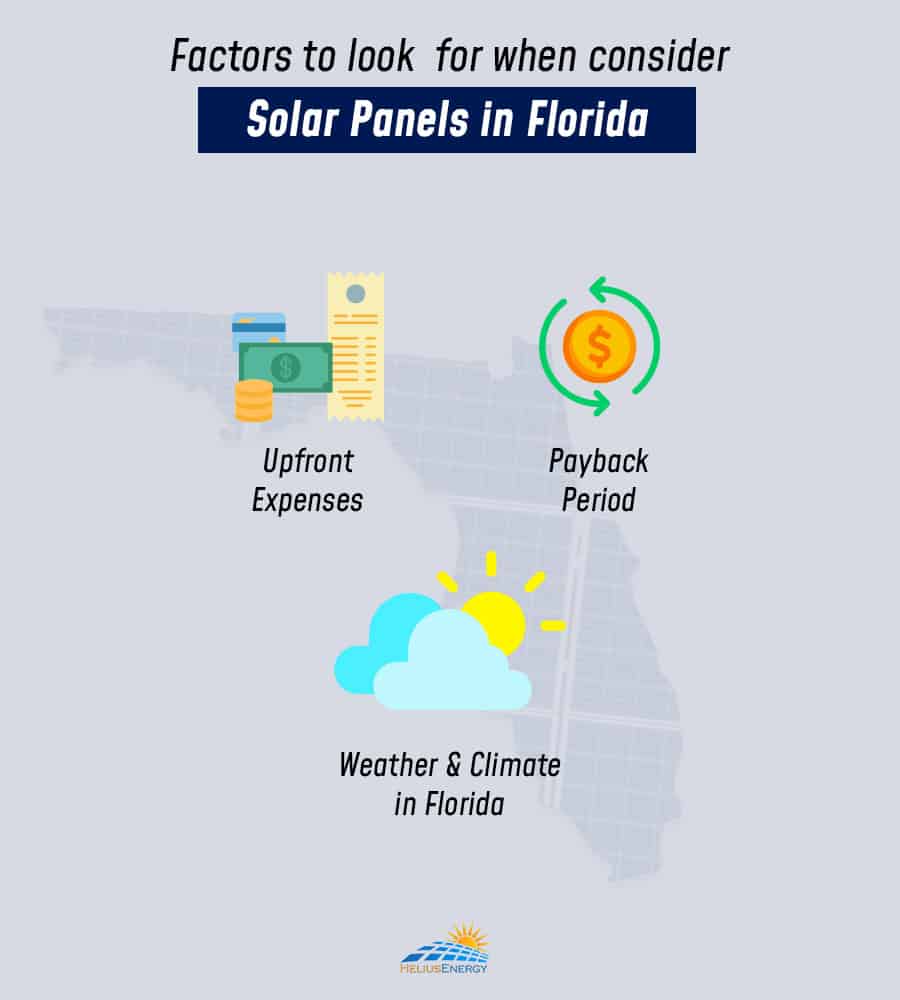
1. Upfront Expenses
Solar panel installation can be pricey upfront, but it’s crucial to keep in mind that adopting solar is frequently less expensive than doing nothing. Remember to compare the initial solar investment to the amount of money you could wind up spending on power over the following 25 years if solar weren’t an option.
It’s also crucial to keep in mind that solar panel owners will be liable for maintenance costs after installation, such as repairing or replacing the inverter.
2. Payback Period
If you want to know whether investing in a solar PV system will be worthwhile for you, look at the solar payback period. Pricing information and an anticipated payback period will be provided in your proposal by any reliable solar company.
The typical range for a good payback period is 8 to 12 years. Solar might not be a good investment for you if you’re close to 20.
3. Weather & Climate In Florida
As we’ve already discussed, the greatest locations for solar panels to operate are those that receive a significant amount of direct sunlight; they are typically located closer to the equator. However, residences in the north may still be a good choice for solar.
Contrary to popular belief, solar panels perform better in colder temperatures because energy moves more quickly. Additionally, rain makes solar panels more efficient. This is because any dirt or filth that accumulates on your panels during the dry seasons will be washed away by showers.
Some of the strongest solar incentive programs in the nation are found in many northern states. Your climate should still be taken into account for solar.
Factors Affecting The Performance Of Solar Panels In Florida
There are many factors that negatively impact solar electricity efficiency and production. We can’t control naturally occurring occurrences like cloudy days, of course. The following list outlines the key elements influencing solar panel efficiency:
- Irradiance- This measures the sun’s energy in peak solar hours (kWh/m2/year) shading. Utilizing micro-inverters, the output can be reduced greatly as a result.)
- Maintenance- Solar panels should be cleaned twice a year for losses of 10% or more to be reduced.
- The majority of installers install highly efficient solar panels of the highest grade.
- Orientation-The best is always due south (in the Northern Hemisphere).
- Lean angle- Aim for a 45–60 degree angle to maximize output.
- Heat– Heat is the enemy, so it’s imperative that there be enough airflow.
Final Thoughts
For the typical American homeowner in 2022, solar energy is financially advantageous under the appropriate circumstances. It’s not, however, a universally applicable energy solution.
Though these elements might indicate whether solar is worthwhile, speaking with a local solar business is the best way to get an actual estimate. Using satellite photos to create a model of your roof, a local provider may analyze your electricity usage habits and offer information on costs and financing possibilities.


